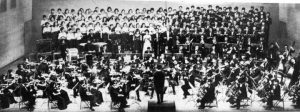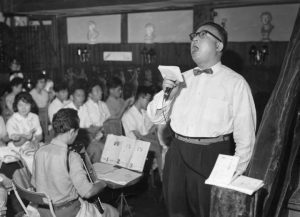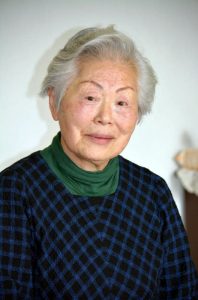Story of Hiroshima Symphony Orchestra’s 50 years since turning pro, Part 1 (4): Starts in A-bombed city as Café Musica fosters “Joy” amid legend of Beethoven’s Ninth
Feb. 18, 2022
by Aya Nishimura, Staff Writer
In 1964, the Hiroshima Civic Symphony Orchestra, the predecessor to the Hiroshima Symphony Orchestra, enthusiastically performed three musical pieces by Beethoven at its first regular concert, receiving enthusiastic applause from the 1,500 audience members who packed the venue. The performers and audience shared in the excitement. What was the story behind the selection of Beethoven as the featured composer? The Chugoku Shimbun will herein trace the thoughts and feelings of Hiroshima’s people, starting with the story of Café Musica, which arose from amid the ruins of the A-bombed city, and its “Ninth Symphony legend.”
Café Musica, a coffee shop renowned for its music, opened at the center of a black market that had developed near Hiroshima Station in the summer of 1946, the year after the end of World War II. In the hopes that music would enrich people’s spirits, the owner of the café, Yoshio Yanagawa, who passed away at the age of 79 in 1995, would travel to Tokyo and Osaka to obtain old albums of Beethoven’s Symphony No. 3 “Eroica,” Symphony No. 5 “Fate,” and Symphony No. 9. Mr. Yanagawa had lost his own father and sister in the atomic bombing.
On New Year’s Eve in 1946, Mr. Yanagawa played Beethoven’s Symphony No. 9 on the café’s gramophone. On that snowy night, those unable to squeeze into the building are said to have strained to hear “Ode to Joy” from outside by pressing their ears against the windowpanes and were moved to tears. The story has become a legend of sorts passed on to this day. With that, the café’s reputation grew and it became a gathering spot for cultural elite including the poet Sankichi Toge. The café’s new home after moving in 1955 to the area of Ebisu-cho in Hiroshima’s Naka Ward was an impressive, and still unusual for the times, three-story building.
Kazuko Imai, 81, a resident of Asaminami Ward who supported the Hiroshima Civic Symphony Orchestra as a violinist, used to visit the café when she was young. “I remember walking up the stairs with my father, who was a great fan of Beethoven,” she said.
Ms. Imai witnessed the flash of light from the atomic bombing at her home 10 kilometers from the hypocenter when she was five years old. She remembers her grandfather, who operated a hospital in the neighborhood, attending to an endless stream of wounded. Her father, who worked as a postmaster after being demobilized from the military, repeatedly went to the city center to engage in the work of restoring the city.
As city reconstruction started to take shape, daily life with music eventually returned. When in fifth grade of elementary school, Ms. Imai began learning to play the violin and, in 1960, she entered Elisabeth Junior College (now the Elisabeth University of Music), which had opened eight years before. After graduation, she worked at a music school for children. She also sometimes performed for the local NHK Hiroshima Orchestra at the request of the group, which was short of violinists.
In April 1964, when the Hiroshima Civic Symphony Orchestra’s first regular concert was held at the Hiroshima City Conference Center, Ms. Imai sat in the front row as the violin section’s second chair. “I was delighted because the program included several pieces of my father’s beloved Beethoven,” she said. The concert began with “Egmont.” Next, Masatsune Yamagami, an assistant professor at Hiroshima University, appeared on stage as the soloist in a performance of Beethoven’s Piano Concerto No. 1. The concert concluded with “Fate,” Beethoven’s Symphony No. 5.
The concert pamphlet contained an advertisement for Café Musica and a message from the owner Mr. Yanagawa about the launch of the symphony orchestra. “With open arms I welcome the orchestra, the establishment of which I had looked forward to for many years, because it will greatly help uplift the sentiment of the people in the local community.”
A column in the July 1956 issue of the magazine Eiga Techo described the people of Hiroshima being encouraged by Beethoven’s music soon after the war ended. “One of Beethoven’s symphonies could be heard emanating from a church that had burned down except for its outer walls … When all of the music had ended, people with beaming faces, as if their spirits had been restored, reluctantly disappeared back into the city of rubble.”
The writer of the column was Toshio Ohashi, a music critic from Hiroshima, who passed away at the age of 73 in 1983. He hosted more than 400 concerts of vinyl recordings after the war ended, mainly at Café Musica. According to his oldest son, Shinobu, 86, a resident of Hatsukaichi City in Hiroshima Prefecture, his family socialized with the family of Dr. Sadamu Takahashi, the first chairman of the Hiroshima Civic Symphony Orchestra who passed away at the age of 62 in 1969.
Music created by Beethoven fostered hope amid great suffering. Ms. Imai remembers how her father would listen to Beethoven’s music on their wind-up gramophone. Among the belongings he left behind was the full score of Beethoven’s Ninth Symphony. “Mr. Takahashi was of the same generation as my father. I believe their deep love of Beethoven was imbued in the Hiroshima Civic Symphony Orchestra’s first regular concert.” Four years after its establishment, the civic orchestra performed the entire Symphony No. 9 for the first time, something Mr. Takahashi had long desired to do.
Keywords
Café Musica
Café Musica opened in the area of Enkobashi-cho in Hiroshima’s Naka Ward in August 1946. After its relocation to Ebisu-cho in the city’s Naka Ward in 1955, it gained popularity as a café at which there was singing. In 1966, the founder Yoshio Yanagawa’s oldest son, Tadataka, took over the café’s management. After temporary closure and relocation, the café reopened in the area of Nishikaniya, in the city’s Minami Ward, in 2000. A vinyl record concert of Beethoven’s Ninth Symphony every New Year’s Eve at the café became a Hiroshima seasonal tradition. The café closed its doors at the end of March 2020.
(Originally published on February 18, 2022)
In 1964, the Hiroshima Civic Symphony Orchestra, the predecessor to the Hiroshima Symphony Orchestra, enthusiastically performed three musical pieces by Beethoven at its first regular concert, receiving enthusiastic applause from the 1,500 audience members who packed the venue. The performers and audience shared in the excitement. What was the story behind the selection of Beethoven as the featured composer? The Chugoku Shimbun will herein trace the thoughts and feelings of Hiroshima’s people, starting with the story of Café Musica, which arose from amid the ruins of the A-bombed city, and its “Ninth Symphony legend.”
Café Musica, a coffee shop renowned for its music, opened at the center of a black market that had developed near Hiroshima Station in the summer of 1946, the year after the end of World War II. In the hopes that music would enrich people’s spirits, the owner of the café, Yoshio Yanagawa, who passed away at the age of 79 in 1995, would travel to Tokyo and Osaka to obtain old albums of Beethoven’s Symphony No. 3 “Eroica,” Symphony No. 5 “Fate,” and Symphony No. 9. Mr. Yanagawa had lost his own father and sister in the atomic bombing.
On New Year’s Eve in 1946, Mr. Yanagawa played Beethoven’s Symphony No. 9 on the café’s gramophone. On that snowy night, those unable to squeeze into the building are said to have strained to hear “Ode to Joy” from outside by pressing their ears against the windowpanes and were moved to tears. The story has become a legend of sorts passed on to this day. With that, the café’s reputation grew and it became a gathering spot for cultural elite including the poet Sankichi Toge. The café’s new home after moving in 1955 to the area of Ebisu-cho in Hiroshima’s Naka Ward was an impressive, and still unusual for the times, three-story building.
Kazuko Imai, 81, a resident of Asaminami Ward who supported the Hiroshima Civic Symphony Orchestra as a violinist, used to visit the café when she was young. “I remember walking up the stairs with my father, who was a great fan of Beethoven,” she said.
Ms. Imai witnessed the flash of light from the atomic bombing at her home 10 kilometers from the hypocenter when she was five years old. She remembers her grandfather, who operated a hospital in the neighborhood, attending to an endless stream of wounded. Her father, who worked as a postmaster after being demobilized from the military, repeatedly went to the city center to engage in the work of restoring the city.
As city reconstruction started to take shape, daily life with music eventually returned. When in fifth grade of elementary school, Ms. Imai began learning to play the violin and, in 1960, she entered Elisabeth Junior College (now the Elisabeth University of Music), which had opened eight years before. After graduation, she worked at a music school for children. She also sometimes performed for the local NHK Hiroshima Orchestra at the request of the group, which was short of violinists.
In April 1964, when the Hiroshima Civic Symphony Orchestra’s first regular concert was held at the Hiroshima City Conference Center, Ms. Imai sat in the front row as the violin section’s second chair. “I was delighted because the program included several pieces of my father’s beloved Beethoven,” she said. The concert began with “Egmont.” Next, Masatsune Yamagami, an assistant professor at Hiroshima University, appeared on stage as the soloist in a performance of Beethoven’s Piano Concerto No. 1. The concert concluded with “Fate,” Beethoven’s Symphony No. 5.
The concert pamphlet contained an advertisement for Café Musica and a message from the owner Mr. Yanagawa about the launch of the symphony orchestra. “With open arms I welcome the orchestra, the establishment of which I had looked forward to for many years, because it will greatly help uplift the sentiment of the people in the local community.”
A column in the July 1956 issue of the magazine Eiga Techo described the people of Hiroshima being encouraged by Beethoven’s music soon after the war ended. “One of Beethoven’s symphonies could be heard emanating from a church that had burned down except for its outer walls … When all of the music had ended, people with beaming faces, as if their spirits had been restored, reluctantly disappeared back into the city of rubble.”
The writer of the column was Toshio Ohashi, a music critic from Hiroshima, who passed away at the age of 73 in 1983. He hosted more than 400 concerts of vinyl recordings after the war ended, mainly at Café Musica. According to his oldest son, Shinobu, 86, a resident of Hatsukaichi City in Hiroshima Prefecture, his family socialized with the family of Dr. Sadamu Takahashi, the first chairman of the Hiroshima Civic Symphony Orchestra who passed away at the age of 62 in 1969.
Music created by Beethoven fostered hope amid great suffering. Ms. Imai remembers how her father would listen to Beethoven’s music on their wind-up gramophone. Among the belongings he left behind was the full score of Beethoven’s Ninth Symphony. “Mr. Takahashi was of the same generation as my father. I believe their deep love of Beethoven was imbued in the Hiroshima Civic Symphony Orchestra’s first regular concert.” Four years after its establishment, the civic orchestra performed the entire Symphony No. 9 for the first time, something Mr. Takahashi had long desired to do.
Keywords
Café Musica
Café Musica opened in the area of Enkobashi-cho in Hiroshima’s Naka Ward in August 1946. After its relocation to Ebisu-cho in the city’s Naka Ward in 1955, it gained popularity as a café at which there was singing. In 1966, the founder Yoshio Yanagawa’s oldest son, Tadataka, took over the café’s management. After temporary closure and relocation, the café reopened in the area of Nishikaniya, in the city’s Minami Ward, in 2000. A vinyl record concert of Beethoven’s Ninth Symphony every New Year’s Eve at the café became a Hiroshima seasonal tradition. The café closed its doors at the end of March 2020.
(Originally published on February 18, 2022)










